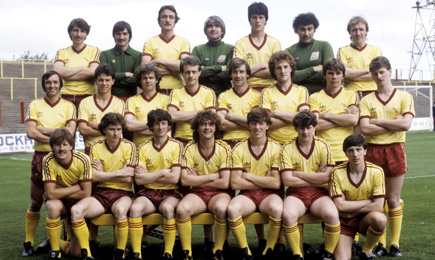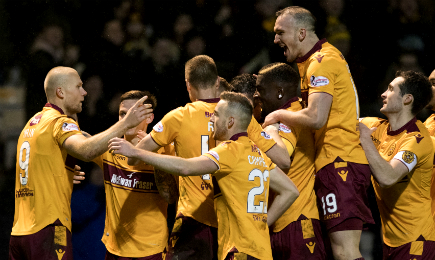Brian McLaughlin was born in Grangemouth on October 7, 1954, and snapped up by Celtic at the age of 16, joining the Parkhead side from schools football, becoming professional in 1971.
Brian starred in the reserve team alongside Kenny Dalglish and Lou Macari that were christened the “Quality Street Kids” by an attentive press. He eventually made his first team debut in September 1972 against Clydebank, and by the following year he had established himself as a regular. No less of an opinion than Jock Stein noted that McLaughlin was the most naturally talented player he had ever signed.
Disaster struck for Brian after 14 successive appearances when he was badly injured by a tackle from Clyde centre half, Willie McVie. The resultant cruciate ligament damage removed him from the game for two years and although he fought back gamely, he lacked the previous mobility and was released to join Ayr United in November 1977.
Manager Ally MacLeod gave Brian a platform to display his talent on a consistent basis, and the midfielder certainly repaid Ally’s faith in him and, much more besides, blossoming into a midfield maestro of great quality. Those who had considered Brian to be finished misjudged the young mans’ great determination.
He went on to have an incredibly good two seasons with the Honest Men, even managing to score the winner against Celtic on Hogmanay 1977 in a famous 2-1 win for Ayr. Such was the quality of his play at Somerset Park, he was rewarded with the Players’ First Division Player of the Year award in 1979.

Meanwhile, 40 minutes up the road and following relegation from the Premier League, Motherwell had made a poor start to the season being knocked out the League Cup by Queen’s Park and failing to win any of their first five league matches.
In September 1979, Ally signed Brian McLaughlin once again, this time for Motherwell where his skills ensured that he would go on to be a firm favourite of the fans on the east terracing.
The manager had been trying to sign Brian since that summer, but Ayr weren’t for letting him go. However, when Motherwell offered £100,000, United accepted and the deal was finally done.
It didn’t take McLaughlin long to make his mark for the Steelmen, scoring on his debut at Douglas Park, but couldn’t prevent a 3-2 defeat for the club. Four days later, despite scoring again, Motherwell were humbled 5-2 by Raith Rovers at Starks Park as pressure began to increase on the manager from the fans.
The following midweek saw Hearts visit Fir Park under the light of the silvery moon, and for the third time on the bounce the new signing was on target again as he finally picked up his first win bonus in North Lanarkshire as the Jambos were humbled 4-2 on a memorable night under the Fir Park lights.
After another three straight wins over Clyde, Dumbarton and St Johnstone it seemed Motherwell were on a roll. However, as is often the case around these parts, the wheels came off. One win in the next eight, a 1-0 victory over Stirling Albion at home, sealed with a McLaughlin pile driver, pretty much ended any promotion hopes that the Steelmen and their fans had harboured.
Although things did pick up after the arrival of Albert Kidd and Joe Carson from Arbroath, the Fir Parkers were always playing catch up with Hearts and Airdrieonians, who both had established a good lead at the top of the table.
Despite ten wins after New Year in the league, Motherwell never really got into contention at the top and finished a rather disappointing sixth, eight points behind Airdrie who, along with winners Hearts, both went up to the Premier League.
After his arrival, Brian was an ever present in the Motherwell line up, playing 35 times and scoring a very respectable ten goals. McLaughlin’s promptings initially lifted Motherwell, flirting with the leaders, but try as he might the Steelmen slipped back down the table, leaving the ‘Well fans feeling frustrated with the form of the side in a division that they were expected to win rather easily.
His first full campaign at Fir Park was 1980/81, which opened brightly for Brian with a hat trick in the second leg of the League Cup first round tie against Stenhousemuir.
The league campaign kicked off disastrously however, hammered 5-0 by a rampant Ayr United side down at Somerset Park. In what was a tough division in this year, Motherwell suffered from our old failing: inconsistency.
Despite recording decisive, good wins against Falkirk, Dundee, Dunfermline and Hibernian there was always a shock scoreline around the corner, like defeats to Berwick Rangers and Stirling Albion. Come New Year’s Day, it felt like the club absolutely had to beat the Accies at Fir Park. Despite Brian scoring, the visitors finished comfortable 3-1 winners, to pretty much end once again our promotion hopes.
After the Ne’erday defeat the Steelmen went on a 15-game unbeaten run in the league, which left the club a hugely disappointing fifth in the final league table of the season. There had been a little flirtation with silverware when 3,000 ‘Well fans headed to Tannadice for a Scottish Cup quarter final against the all conquering Dundee United, after a battle cry from Ally MacLeod. The manager had caught the imagination of everyone claiming that Motherwell were definite contenders to lift the old trophy despite being mid table in the second tier of Scottish Football.
Sadly, by half time, Motherwell were 4-1 down and out of the competition. By the end of the campaign, Ally MacLeod was somewhat under pressure from sections of the Motherwell support, as the club reluctantly looked forward to a third season out with the top flight of Scottish football.
The board decided that there had been enough positives in the last 15 matches of the campaign to remain firmly behind the manager in his attempt to finally secure a berth back in amongst the big guns. Brian had played in 42 games that season, the most he had every managed, scoring nine goals. It wasn’t long into the new season that the Motherwell board did lose its confidence in Ally MacLeod and he left his position which was quickly filled by his assistant, David Hay.
Hay’s first game in charge was a disappointing defeat down at Rugby Park, but a single Willie Irvine goal beat Queen’s Park at Fir Park a week later in front of a paltry crowd of less than 2,000 fans, which did spark an upturn in fortunes.
Brian McLaughlin scored nine times in six of the next seven matches as the Steelmen beat St Johnstone, Falkirk, Dumbarton, Raith Rovers, Dunfermline Athletic and East Stirlingshire, after finishing level with Hamilton Accies in an enthralling 2-2 draw.
That impressive run took the Fir Parkers to the top of the table as confidence began to build within the ranks. The transformation in the Steelmen from the early season under McLeod, to the quality of play produced by the team under Hay just a few weeks later, was remarkable without adding anyone to the squad.
As October arrived, Motherwell went from strength to strength as McLaughlin opened the scoring when East Stirlingshire were defeated away at Fir Park 3-0, before two weeks later producing a memorable display at Kilbowie against Clydebank.
The home side were ripped apart in a vintage performance by the Steelmen in a 7-1 rout. The man of the match that day be a country mile was Brian McLaughlin, who dictated the pace and control of the game in a manner I have rarely seen.
Incredibly, Brian didn’t find the net that afternoon, but had a hand in five of the seven goals Motherwell scored, as belief that the title might be heading our way began to spread throughout the claret and amber support.
As promotion got closer, Brian continued to have a major influence on those around him, while still scoring vital goals in important games for the club. He shot Motherwell ahead in the Lanarkshire derby against the Accies in March, before setting up both Bruce Clelland and Willie Irvine to score in a 3-2 win.
Two further single goal victories over Kilmarnock at Fir Park and away at Raith Rovers, both scored by McLaughlin took Motherwell to the brink of the Championship.
Four days later the title was clinched, after one of the poorest performances from the Steelmen in what had been a terrific campaign, at home to Clydebank in front of the BBC TV cameras. It finished goalless, before the Motherwell fans swarmed onto the pitch in celebration at the final whistle to mob the players, signalling the end of the club’s three-year exile from the Premier Division.
The season had been a triumph for David Hay as he saw his side romp away with the title, scoring 92 times to create a First Division record for goal scoring. Quite amazingly, three players claimed 56 of them, Willie Irvine, along with Brian netting 20 goals apiece and Bruce Clelland contributing 16.
An indication of how much McLaughlin had an effect on the championship win is the fact that 11 of his goals opened the scoring for Motherwell in matches in which only two points were dropped by the Steelmen.
In a Motherwell squad that was packed with very good footballers, it was evident to everyone who watched them play that season that Brian McLaughlin was the talismanic figure in which Davie Hay had built his successful side around.
Brian played 43 times in that memorable season. Only Steve McLelland, John Gahagan and Willie Irvine played more as he made a mockery of the injury prone tag often attached to him.
Back in the big time, Brian had the stage he had been craving for: an opportunity to display his talents and show everyone that he could dictate matches at the highest level in this country.
However, new manager Jock Wallace didn’t share Brian’s vision for the future. After starting the first two fixtures against Rangers and Dundee, he left both Brian and record goal scorer, Willie Irvine on the substitute bench for the visit of a Charlie Nicholas inspired Celtic. The game ended in a heavy defeat and Brian was rarely seen again in claret and amber.
Midway through the Premier League campaign, and after being unfairly treated by Wallace, Brian was allowed to leave for pastures new, which he did, joining Hamilton Accies back in the First Division. He then served his local side Falkirk, before a brief spell in Australia and then back to Ayr United before hanging up his boots, ending a career that had promised so much.
In August 2009, Brian died as a result of an accident in tragic circumstances, being found in the Union Canal near his home in Falkirk. He was only 54 years old.
Brian McLaughlin played for Motherwell 131 times, scoring 41 goals from midfield and was the architect and focal point of one of the most entertaining squads ever witnessed. It would be stretching it a little to suggest that Brian had this football club in his heart, but his contribution in just over three years cannot be understated.
The pressure everyone at Fir Park were under as they tried to win promotion at the third attempt, reportedly the last throw of the dice for Motherwell before going part time, cannot be underestimated.
Had Brian not produced the stats and the goods he did in the championship winning season, there is every chance we would be watching the Steelmen this afternoon in lower league football lining up against our peers of the 80s such as Morton, Ayr United, Airdrie and Clyde.
They say success and failure in football is all about fine margins. If that’s the case, then we all should be grateful that when Brian joined Motherwell, the odds shifted distinctly in our favour.





























